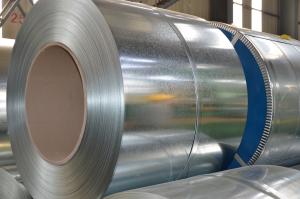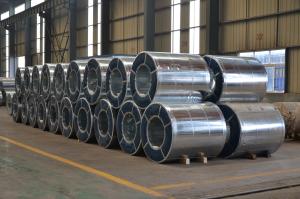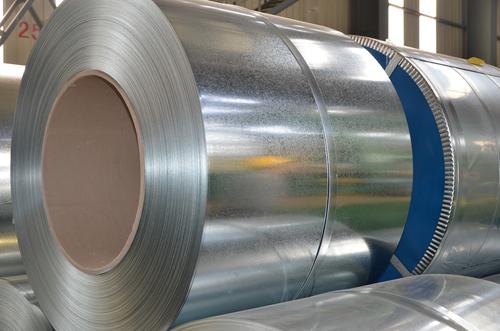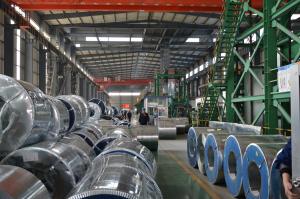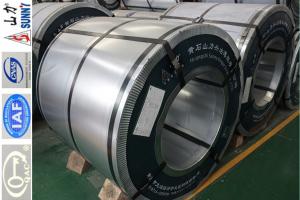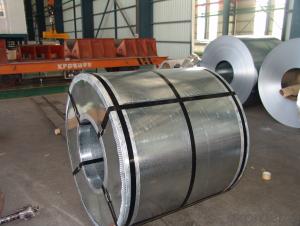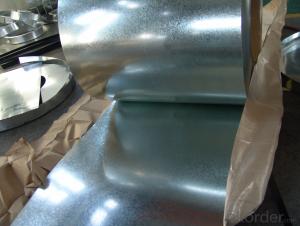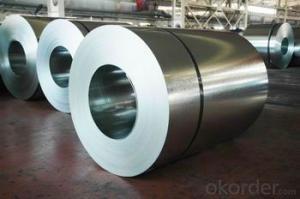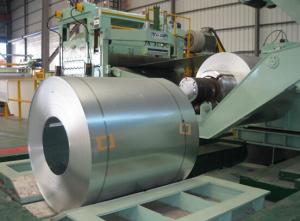galvanized steel coils
- Loading Port:
- China Main Port
- Payment Terms:
- TT OR LC
- Min Order Qty:
- -
- Supply Capability:
- -
OKorder Service Pledge
OKorder Financial Service
You Might Also Like
1) Quality Standard & Grade: JIS G3302, SGCC / ASTM 653M CQ/ EN10142 DX51D+Z
2) Thikness tolerance: +/-0.02mm Width tolerance:+/0.02mm
3) Zinc coating weight: 50g/m2
4) WEIGHT OF PER COIL: 3-5MT
5)Technology: cold rolled
6) Surface of Product: regular spangle / big spangle/ small spangle; Surface Treatment: chromated , non oiled, skin passed
7) Packing: export standard packing,packed with moisture resistant paper and metal
wrapping,securely tied for export,on metal skids7) Country of Origin :
SIZE:0.2*914
- Q: What are the quality standards for steel coil manufacturing?
- The quality standards for steel coil manufacturing typically include criteria such as dimensional accuracy, surface finish, mechanical properties, chemical composition, and adherence to industry-specific standards like ASTM or EN. These standards ensure that the steel coils meet the required specifications for various applications and provide reliable performance in terms of strength, durability, and consistency. Additionally, manufacturers often follow strict quality control processes throughout the production cycle to ensure the quality of the final product.
- Q: basically a builder told us steel is good but when we got MFI, BQ they only have acrylic
- Steel and cast iron are the premium types of tubs. Acrylic will scratch and dull if you don't use proper cleaners. If they are not installed with the proper support, they will flex and tear loose the caulking around the edges.
- Q: How are steel coils used in the production of oil and gas machinery?
- Steel coils are used in the production of oil and gas machinery to create various components, such as pipelines, storage tanks, pressure vessels, and drilling equipment. The coils are typically shaped and welded to form these structures, which provide the necessary strength and durability required for the demanding conditions of the oil and gas industry.
- Q: What are the common challenges faced in steel coil production?
- Some common challenges faced in steel coil production include ensuring consistent quality and thickness of the coil, maintaining efficient production rates, managing inventory and storage of coils, addressing issues related to coil surface defects and handling, and adhering to strict safety regulations. Additionally, fluctuations in raw material prices and market demand pose further challenges for steel coil producers.
- Q: How are steel coils annealed to improve their properties?
- Steel coils are annealed to improve their properties through a process called annealing, which involves heating the coils to a specific temperature and then slowly cooling them. This process helps to relieve internal stresses, enhance ductility and toughness, and refine the grain structure of the steel, resulting in improved mechanical properties such as increased strength and reduced brittleness.
- Q: What are the different types of steel coil slitting techniques?
- There are several types of steel coil slitting techniques, including rotary shear slitting, loop slitting, and oscillating slitting.
- Q: How are steel coils used in the manufacturing of safety systems?
- Steel coils are commonly used in the manufacturing of safety systems such as airbags and seat belts. The steel coils are formed into springs which provide the necessary tension and force to ensure the proper functioning of these safety devices. The coils are carefully designed and integrated into the system to enhance its performance and reliability, ultimately helping to protect occupants in the event of a collision.
- Q: How are steel coils used in the manufacturing of storage racks?
- Steel coils are used in the manufacturing of storage racks by being cut into smaller, more manageable pieces that are then shaped and welded into the desired rack structure. The strength and durability of the steel coils make them an ideal material for supporting heavy loads and ensuring the stability of the storage racks.
- Q: Would the Ruger Sr22 pistol or the SW MP 15-22 be any good for the steel challenge?
- Steel plates are very difficult for a .22lr
- Q: What is the tensile strength of a steel coil?
- The tensile strength of a steel coil refers to the maximum amount of stress or force that the coil can withstand before breaking or undergoing permanent deformation. It is a measure of the coil's ability to resist stretching or pulling apart. The specific tensile strength of a steel coil can vary depending on the type and grade of steel used, as well as the manufacturing process and any additional treatments or coatings applied. Generally, steel coils have high tensile strength, typically ranging from 300 to 2,000 megapascals (MPa). The tensile strength is an important property to consider when determining the suitability of a steel coil for various applications, such as in construction, automotive, or manufacturing industries.
Send your message to us
galvanized steel coils
- Loading Port:
- China Main Port
- Payment Terms:
- TT OR LC
- Min Order Qty:
- -
- Supply Capability:
- -
OKorder Service Pledge
OKorder Financial Service
Similar products
Hot products
Hot Searches
Related keywords
